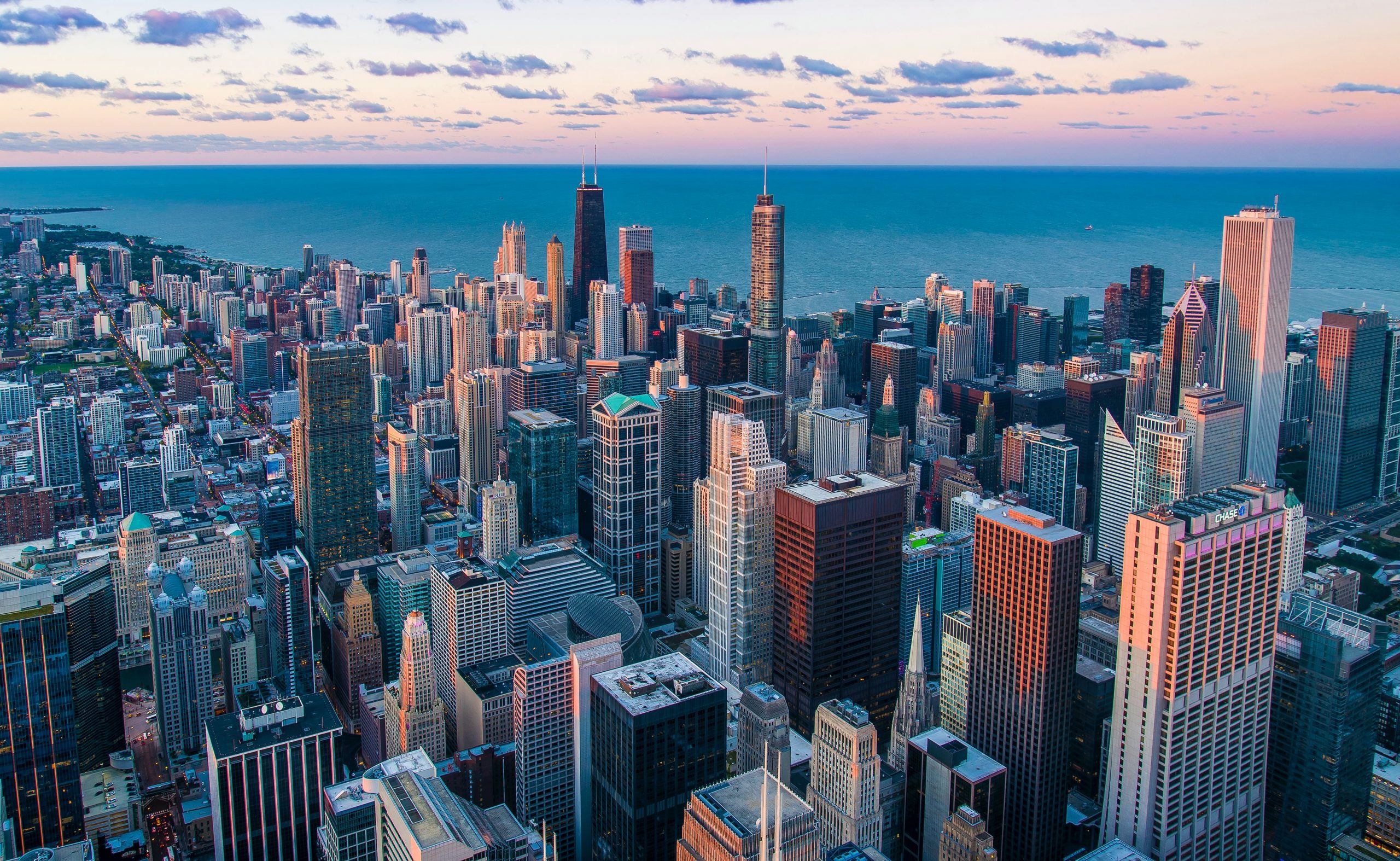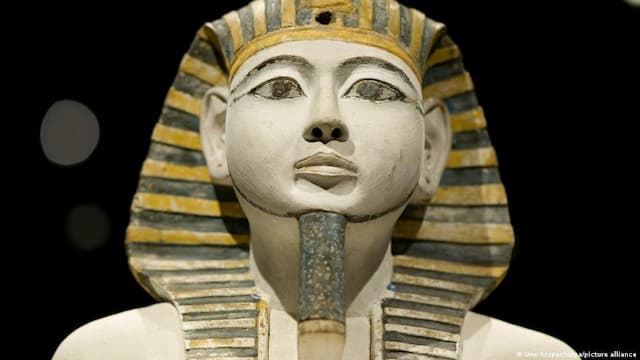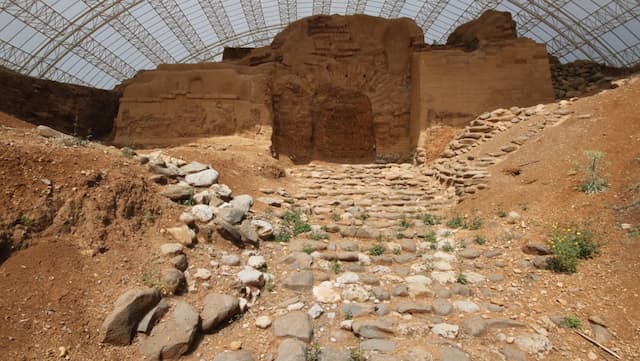Looking for a city (Hebrews 11:10)

Why was Abraham looking for a city? He already had one.
Augustine knew: our faith leads us to “the city of God.” Faith may be seeking understanding, but that’s not all. Faith seeks embodiment as a city under God.
Abraham knew: By faith, Abraham … went … for he was looking for a city (Hebrews 11:10).
Did you ever wonder why he lived like that when he already had a city?
The city Abraham left
Ur of the Chaldees was arguably the most renowned city of the legendary Sumerian kingdom, the greatest civilization of the Middle East in ancient times. You can still visit the ziggurat of Ur near Nasiriyah in Iraq today. It’s a mammoth man-made mud-brick structure that reminds many people of the tower of Babel.
Abraham and family left it all, anticipating a different city:
Hebrews 11:8–10 (NIV)
8 By faith Abraham, when called to go to a place he would later receive as his inheritance, obeyed and went, even though he did not know where he was going. 9 By faith he made his home in the promised land like a stranger in a foreign country; he lived in tents, as did Isaac and Jacob, who were heirs with him of the same promise. 10 For he was looking forward to the city with foundations, whose architect and builder is God.
I guess there was something wrong with the city Abraham had, something wrong with its foundations. That’s why God called him to leave the land of Babel: The Lord had said to Abram, “Go from your country …” (Genesis 12:1).
Why? The previous chapter provides the context. Everything about Babel wreaked of human power. Architecture speaks: they rejected natural stone for man-made bricks (Genesis 11:3). We remember the tower of Babel, but the tower was secondary. It was actually a city with a tower (verses 4, 5), and it was the city that God blocked (verse 8). The city was an administrative centre designed to give them the acclaim to rule the world. The tower was an architectural wonder designed to tell everyone they had reached up to the heavens and brought down the power of the gods into human hands (verse 4).
A city based on our own power enslaves the world. We were already warned that Babel (Babylon) and Assyria were kingdoms that extended their power by hunting others (Genesis 10:9-12). These kingdoms threatened the kingdom that God would establish through Abraham, the family that called on the name of the Lord to lead them.
That’s why Abraham left the city of Ur in the land of the Babel-builders. By faith, Abraham went, leaving the man-made city, living in a tent, for he was looking for a different kind of city.
The city Abraham sought
By faith, Abraham anticipated a city that did not take the power of heaven into human hands, a city that would willingly enter into covenant relationship with the heavenly sovereign, so his power came to us.
This is not a city established by conquest. This is a city established by God, founded on a covenant partnership between heaven and earth, a city architected and built by God.
God established his nation when he rescued Jacob’s descendants from Pharaoh’s grasp. With Pharaoh’s army on the floor of the Red Sea, God’s people sang of the city they would become with God living among them: You will bring them in and plant them on the mountain of your inheritance — the place, Lord, you made for your dwelling, the sanctuary, Lord, your hands established (Exodus 15:17).
It was the City of David when the Lord’s anointed chose Jerusalem as the city to house God’s throne (2 Samuel 5:9; 2 Samuel 7:2). This city was the seat of God’s reign: the city of our God … the city of the Great King … the city of the Lord Almighty … the city of our God: God makes her secure forever (Psalm 48:1, 2, 8).
But Babel was still fighting to take over God’s world. Babylon conquered the city of God, destroyed the house of God, dethroned the Lord’s anointed, took his people into captivity.
In time, the house of God and the walls of the city were rebuilt, but it was never again the city where God reigned through his anointed.
Until …
The city established by God
God’s anointed set his face to go to Jerusalem (Luke 9:51). Would he find a city ready for the restoration of God’s reign? Of would he find a city occupied by bandits who would kill to keep their power?
Luke 13:34 (ESV)
O Jerusalem, Jerusalem, the city that kills the prophets and stones those who are sent to it! How often would I have gathered your children together as a hen gathers her brood under her wings, and you were not willing!”
There was nothing to rebuild here. No foundation. He told them, the time will come when not one stone will be left on another; every one of them will be thrown down (Luke 21:6).
The city was under Roman occupation, but the Empire was not the problem. While some honoured the king who comes in the name of the Lord (Luke 19:38), the leaders of the city handed him over to the Empire that laid claim to being “the eternal city” — Rome.
God sent his Son, but he was executed on a Roman cross, sharing in the suffering that human sin has caused for all the peoples of the earth. The Christ entered the sufferings of his people, was crucified under Pontius Pilate, and died outside the city as a rejected ruler.
But on the third day, the Architect of history laid a new foundation by raising his faithful Son from the dead and giving him all authority to unify heaven’s reign with his earthly kingdom.
The resurrection of the Son of God established a new covenant between heaven and earth. The city covered by this covenant is far more extensive, incorporating all the peoples of the earth into the reign of heaven in Jesus Christ our Lord. He is the foundation of the city whose architect and builder is God.
The city Abraham was looking for was established not with a crossbow, but with a cross.
Living in God’s city
Some are still discovering this city, but we live our lives there: You have come to Mount Zion, to the city of the living God, the heavenly Jerusalem (Hebrews 12:22).
This is not a rebellious city established by trying to grasp God-power with bloodstained hands. This is a holy city, established by God coming down to draw us into partnership with himself, preparing us as a bride beautifully dressed for her husband. This is a city where we share in the life of our heavenly sovereign, where God’s dwelling place is now among the people, and he will dwell with them. They will be his people, and God himself will be with them and be their God. (Revelation 21:2-3)
This is the city we’ve yearned for, where our heavenly sovereign will wipe every tear from their eyes, where there will be no more death or mourning or crying of pain. This is the city where the old order of things has passed away because everything is restored into the care of the one who has always been seated on the throne, the sovereign who calls us to see what it was all about: Look! I am making everything new! (Revelation 21:4-5)
It’s not fully here yet, but it is here for those who recognize God’s government in Jesus our Lord. For those who don’t, the city is still coming. Unlike Babel, God is not forcing his reign on the world.
Conclusion
Abraham yearned for this city. This hope led him to leave the seemingly solid city of Ur. This faith led him to live in tents like a stranger on the way to another city, even suffering when Babel’s kings tried to take the land (Genesis 14).
Don’t give up if you suffer hurt and rejection from those who live for their own power. Don’t throw away your confidence; it will be richly rewarded (Hebrews 10:35). This city has foundations. Its architect and builder is God.
It comes down to who you trust to sort things out. Faith is the basis of what we are hoping for, the embodied expressions of what cannot be seen (Hebrews 11:1).
What others are saying
Augustine, “The City of God,” in St. Augustin’s City of God and Christian Doctrine, A Select Library of the Nicene and Post-Nicene Fathers of the Christian Church, 1:2 (Buffalo, NY: Christian Literature Company, 1887), 1:
The glorious city of God is my theme in this work … I have undertaken its defence against those who prefer their own gods to the Founder of this city, — a city surpassingly glorious, whether we view it as it still lives by faith in this fleeting course of time … or as it shall dwell in the fixed stability of its eternal seat … For the King and Founder of this city of which we speak, has in Scripture uttered to His people a dictum of the divine law in these words: “God resisteth the proud, but giveth grace unto the humble.” …
And therefore, as the plan of this work we have undertaken requires, and as occasion offers, we must speak also of the earthly city, which, though it be mistress of the nations, is itself ruled by its lust of rule.
Gareth Lee Cockerill, The Epistle to the Hebrews, NICNT (Grand Rapids, MI: Eerdmans, 2012), 540–541:
The fact that Abraham spent his whole life as a temporary resident, without citizenship in the supposed “land of promise,” shows that the “place” (v. 8) he anticipated was “a City that” had “foundations, whose architect and builder” was “God” — the same God who called him to “set out” from his home. Abraham endured this life as a stranger and alien …
Because the God-established permanent City is the first description within this chapter of the goal pursued by the faithful, it sets the direction for what follows. Its importance is substantiated by the way the pastor draws his history to a close, bringing his hearers to “the City of the living God, the heavenly Jerusalem” (12:22–24; cf. 3:14). This imagery reminds them of the way Scripture describes Jerusalem past and future as a city firmly established by God. The permanence of this city is evidenced by its “foundations.” Those who now dwell in “tents” (v. 9) because they are strangers in this world will enjoy its unfading durability. Although this city can be described as “heavenly” (12:24), it does not derive its enduring nature merely from its location. It is permanent and utterly superior to the cities of this world because its “architect and builder is God.”
Tom Wright, Hebrews for Everyone (London: SPCK, 2004), 133:
This city, mentioned here in verse 10 for the first time, suddenly emerges as a main theme in these last chapters of the letter. Here and in verse 16 it is the focal point of the promise about the land; in 12:22 it is the heavenly Jerusalem; in 13:14 it is the future city, contrasted with any city to which one might give allegiance here on earth, and perhaps particularly the earthly Jerusalem itself. What exactly does the writer have in mind?
Jerusalem was of course the holy city, David’s ancient capital, the centre of the promised land. But, in some ancient Jewish writings roughly contemporary with the New Testament, there were pointers to a deeper reality, to the belief that God had established a ‘true’ or heavenly Jerusalem, waiting for the day when heaven and earth would be remade (or, as the present letter puts it, ‘shaken’, so that what is unshakeable may remain). This is picked up in the great description of the new Jerusalem in Revelation 21 and 22, and something of the same idea is assumed here.
Related posts
- When faith is a struggle (Heb 10:37–39)
- Covenant with Abram (Gen 15:7-21)
- Searching for faith
- Finding faith
Seeking to understand Jesus in the terms he chose to describe himself: son of man (his identity), and kingdom of God (his mission). Riverview Church, Perth, Western Australia
View all posts by Allen Browne










